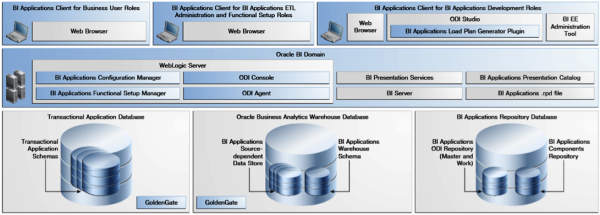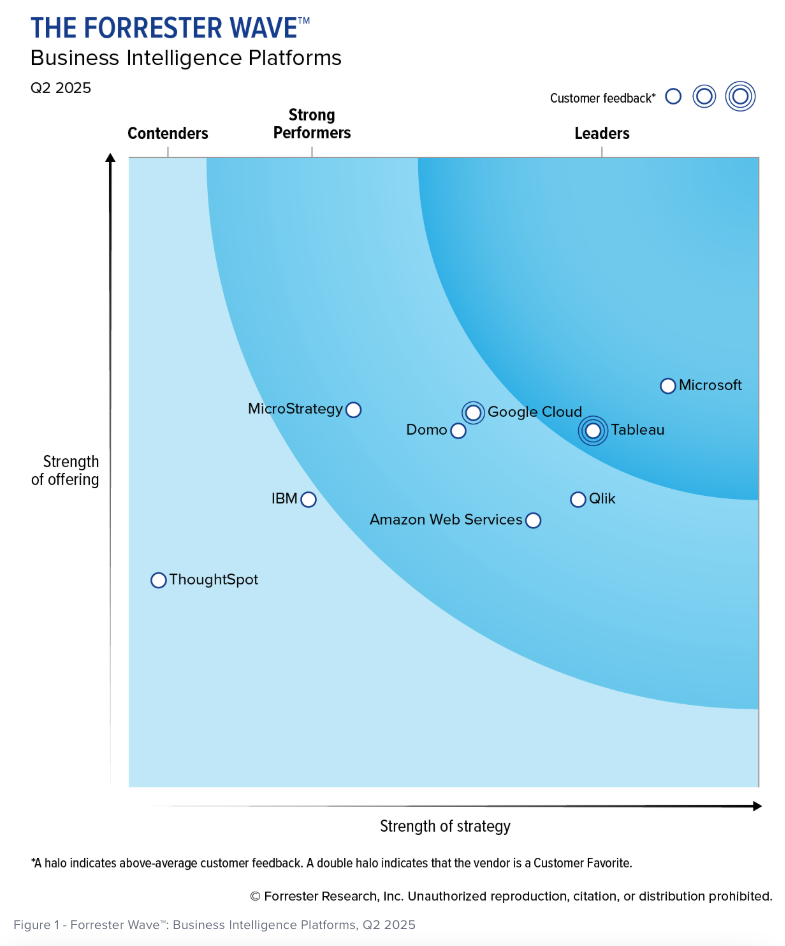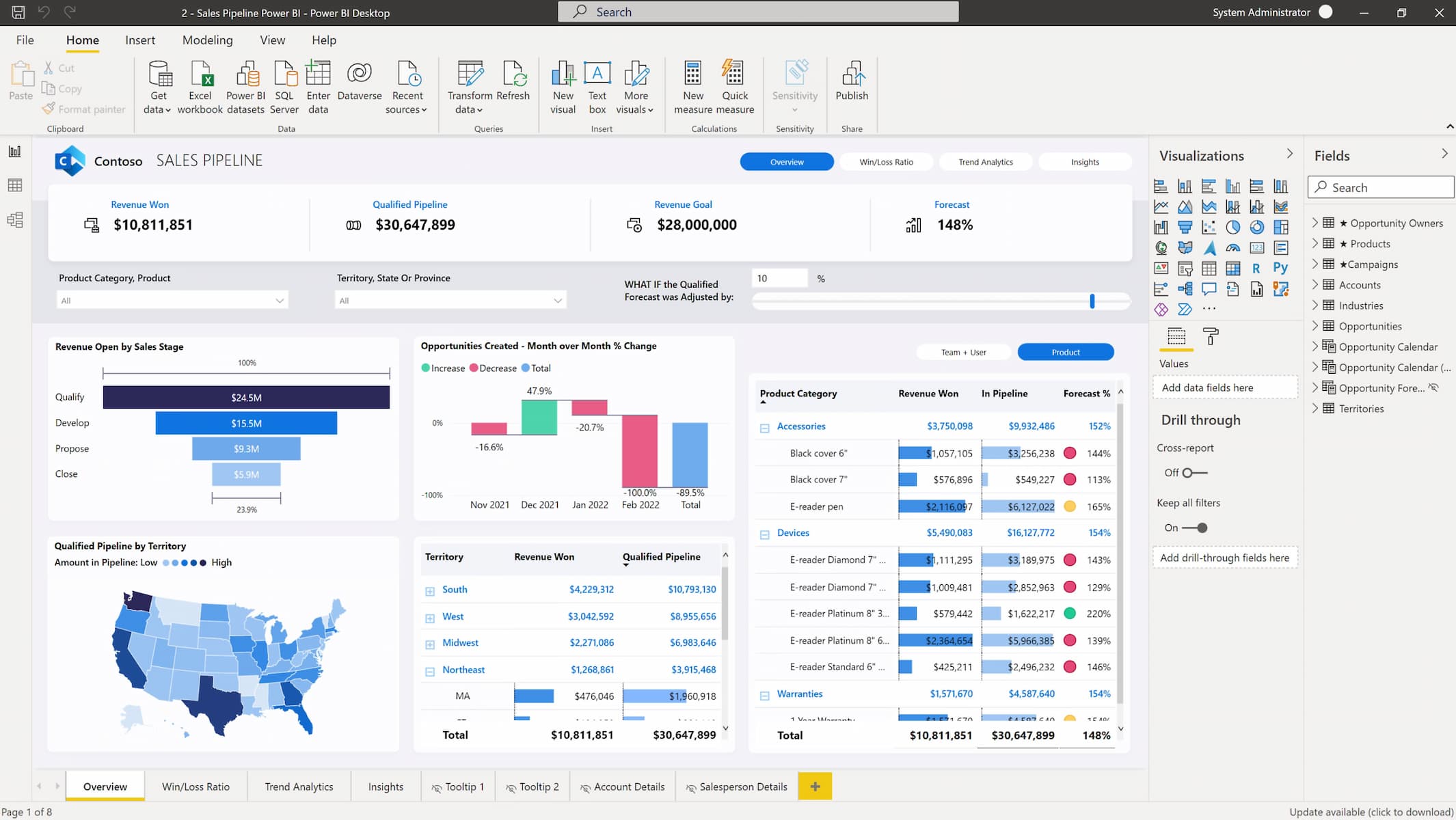by Shiva Molabanti
The new Oracle BI Applications 11.1.1.7.1 has been completely re-architected to leverage the power of ODI with its E-L-T (Extract-Load-Transfer) architecture and has new out-of-the-box tools to increase the productivity and lower down the total cost of ownership (TCO). The Oracle BI Apps 11.1.1.7.1 has significantly expanded with new analytical contents.
Components of Oracle BI Applications 11.1.1.7.1:
Source Systems: The Oracle or non-Oracle OLTP (On-Line Transaction Processing) systems that hold data for ETL (Extract-Transform-Load) into the Oracle Business Analytics Warehouse. This data is the underlying data for your analyses and can include customer information, inventory, sales, marketing, accounts, and other types of data you collect about your business.
Oracle Business Intelligence Enterprise Edition: Oracle Business Intelligence Enterprise Edition (Oracle BI EE or OBIEE) is a business intelligence platform that is used to access and present data in easy-to-understand dashboard & reporting formats, such as tables, graphs, scorecards, KPIs, etc.
Oracle Business Analytics Warehouse: The Oracle Business Analytics Warehouse is a modular enterprise-wide data warehouse data model with conformed dimensions for data integrated from multiple sources. The Oracle Business Analytics Warehouse supports the analytical requirements of Oracle Business Intelligence Applications.
Oracle BI Applications Configuration Manager (BIACM) and Functional Setup Manager (FSM): This is similar to DAC (Datawarehouse Administration Console) tool. But unlike DAC, The BIACM and FSM have great features and functionality in Oracle BI APPS 11.1.1.7.1 to simplify the configurations process, minimize the manual steps and configurations, and to have a guided list of configurations steps and checklists. That reduces the dependency on documentation….
-
Oracle BI Applications Configuration Manager (BIACM): The BIACM is a web-based user interface (UI) application for setting up and maintaining an Oracle Business Intelligence Applications environment. Oracle BI Applications Configuration Manager works in conjunction with Functional Setup Manager to provide guided Tasks to configure Offerings and Functional Areas.
-
Functional Setup Manager (FSM): The FSM is also a web-based UI application which enables you to manage and perform functional configuration tasks and to deploy the offering and functional areas that were selected. Functional Setup Manager generates a list of configuration tasks for the deployed areas, which you can assign to different functional developers and monitor the implementation status.
Oracle Data Integrator: Oracle BI Applications uses Oracle Data Integrator (ODI) as its data integration platform. Oracle Data Integrator is a comprehensive data integration platform that covers all data integration requirements: from high-volume, high-performance batch loads, to event-driven, trickle-feed integration processes, to SOA-enabled data services with Oracle Data Integrator's Innovative E-LT (Extract-Load-Transform) Architecture.
E-LT is an innovative approach to extracting, loading and Transforming data. Typically ETL application vendors have relied on costly heavyweight; mid-tier server to perform the transformations required when moving large volumes of data around the enterprise. ODI delivers unique next-generation, Extract-Load-Transform (E-LT) technology that improves performance and reduces data integration costs, even across heterogeneous systems by pushing the processing required down to the typically large and powerful database servers already in place within the enterprise.
In an Oracle BI Applications environment, ODI works in conjunction with Oracle BI Applications Configuration Manager, which provides a user interface for managing load plans as well as access to ODI Console, the web-based console that enables you to view objects in the ODI repository.
Oracle GoldenGate: Oracle GoldenGate is an optional product. Oracle GoldenGate is a data replication tool leveraged to create a replicated OLTP schema. This replicated OLTP schema is used as a source-dependent schema during ETL.
Visual Overview of Oracle BI Apps 11.1.1.7.1:

Oracle BI Applications use all of the components depicted in above figure to deliver information specific to your business needs. The source system (OLTP) data is loaded into the Business Analytics Warehouse Database (OLAP) and it is transformed using the ODI mappings that are stored in the BI Applications Repository Database. This database contains the repository information for the Oracle BI Applications ODI repository and the BI Applications Components Repository.
Optionally, you can leverage Oracle GoldenGate to replicate your OLTPs data and then to do Source – Dependent load. This helps us to least dependent on the source system availability for ELT operations.
 |
Shiva Molabanti is a Manager and Senior Architect at KPI Partners. He is a business intelligence enthusiast who likes blogging about acquisitions in the BI space, technical workings of BI tools, and Oracle Business Intelligence. Visit Shiva at his personal blog or check out Shiva's blog at KPIPartners.com. |




Comments
Comments not added yet!